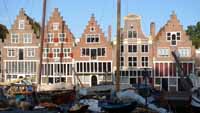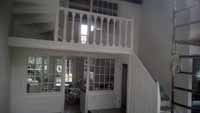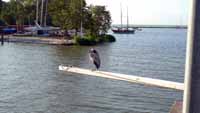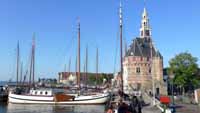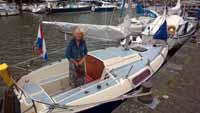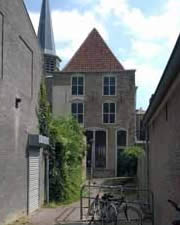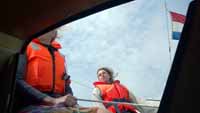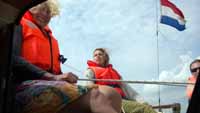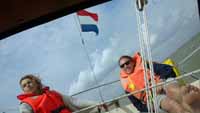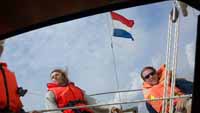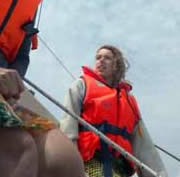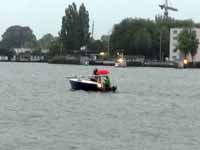Sailing Holiday 2015 Wednesday 15th July until Monday 27th July.
If I’m honest, I wasn’t looking forward to sleeping in our little boat. Not at all. Victoria, as is her way, convinced me to leave the bunk I usually pretended to sleep in and to join her in the fore-cabin, to sleep with our feet snugly squashed together in the point of the bow. I had always insisted it wouldn't fit. But it did. Just. A necessary condition is that we exercise strict spooning discipline every time one of us (usually me) insists on turning over. In the end it proved the solution and we fitted together like the sea and the land along a quiet coast. Apart from a bad first night, which is no more than can be expected, we slept well.
It sounds pathetic, of course it does, but this was easily the most important bit about our holiday. This, and the incredible acrobatics I was able to perfect over the twelve days we were away, distributing my weight on the right bits, and avoiding the wrong ones in emerging from our cave at least three times a night by properly sequencing the folding and unfolding of my limbs without ever waking up Victoria, and kneeling upon a specially placed cushion in front of the pee bucket to do my business in peace and quiet, without constraints. It made peeing into something like prayer with yoga, which of course it is. All the rest, even the most beautiful building, was secondary to this, which only goes to show how important obsessions become with age.
The boat looked glorious. We had painted the deck, cream and grey, bought a new mainsail sheet, which Reino had found at a discount, and new silky navy blue mooring ropes, which I had found at a discount in the same shop.
Everything looked pretty and homely in the cabin: Laura Ashley cushions, raincoats colourfully arranged on a hook. Books and maps and bright blue boxes stuffed with useful things on the shelves. Clothes and life jackets carefully stashed with forethought. Useful other bits in this cubby hole, food and drink in that one. Pots and pans carefully stowed to prevent rattling. Victoria and I are good at playing house. We do it wherever we go.
We met Rick and Kath on the morning of the Wednesday at 6.00 in the harbour, thinking we could make the bridge of the A44 just outside Kaagdorp by 7. It turned out that Rick and I had both read old information. We just missed the 6.30 opening when we got there and the bridge wouldn’t open up again until after the morning traffic, at nine. So much for our early rise. Bracing the light drizzle, we moored and had breakfast the four of us in their wonderful boat.
We had chosen to go clockwise around the Ringvaart via Haarlem this time, keeping our masts standing. To go through the Amsterdam canals means to either strike your mast, which is a lot of bother, or to wait for the official standing mast convoy held at the ungodly hour of two in the morning. The choice was simple.
After a straightforward trip through all the villages and towns along the way, we arrived at the Cruquius pumping engine, long responsible for keeping Schiphol dry, with its enormous steel protuberances and flamboyant gothic revival windows. The cruquius announced the approach of Haarlem as did the many beautiful houses along the banks. Through Haarlem we had to pass eight or nine bridges of various types and techniques, each of them opening in harmonious succession to accommodate our reasonably impressive convoy of barges and yachts, of which ours was by far the smallest. The last bridge failed to open. Bells rang, lights flashed, barges waited impatiently, and it took a while to mend, but mended it was, in the end. After that we had to wait again for the bridge over the A9 which only opens three times a day.
Once we passed that, we travelled along the stark banks of the North Sea Canal, with its secretive harbours, looming ships, loaded with god knows what from endless anonymous sheds with gigantic cranes shaped like monstrous birds or giant chairs. Eventually the North Sea Canal became the IJ and we passed through Amsterdam. I think we reached the Orange Sluices at about eleven at night.
We went for anchor in Durgerdam and the next morning set sail for Muiden to pick up Rosie who wanted to join us for the day. Putting her bicycle in the cabin, which only just fitted, even after we had taken off the front wheel, we tacked our way to Monnikendam in a fresh breeze, stopping to swim along the way and were kept happy with Victoria's wonderful lunches.
We arrived about eight in the evening. Rosie happily cycled off back to Amsterdam where she is flat-sitting an apartment on the Keizersgracht and looking after cats with diabetes. In Monnikendam the four of us sat on the quay and had our supper. The strengthening wind was pushing our boats against the quay, so late at night we slipped into a more sheltered spot and spent a quiet night. The next day Rick and I had a good time repairing bits and pieces to our boats as the sail shop in Monikkendam was closing down and selling stuff at half-price. Victoria and Kath in the meantime fed us smoked eel sandwiches from the local eel-smoking fair which took place right next to our mooring place. I got new white tubing to cover the shrouds, a new stern light, and a new plug for the mast light, which had been broken for as long as we had the boat.
In the afternoon we braced what we thought would be a Bft. 5 breeze to Hoorn. In fact it turned out to be a strong wind of Bft 6 with gusts of 7. We had laid a reef before starting, so we were alright, but it was an exciting sail, probably the best of the holiday, sailing beam reach all the way up and going at a hell of a rate. Wonderful. Stupidly we decided to take down the sails before we got into the outer harbour of Hoorn which was a bit hair-raising. Victoria was brilliant though, on her knees, holding on for dear life as she took down the genoa, her bum and blond hair rising and falling with the pounding waves as if she was riding a bull. But she was cheerful about it and took it all in a day’s work. What a hero.
The first night in Hoorn we stayed in the outer harbour which was a bit choppy. Rick and Kath made the better decision by going to the marina. Our anchor didn’t hold and in the middle of the night we ran aground on the lee shore. But that didn’t really matter, we just motored back out and threw out the anchor again. The next morning we went into the old harbour and secured a good place for ourselves. We then hired bicycles to do a 50 km tour around North Holland, visiting lovely little villages such as Bobeldijk and Twisk: gorgeous farms and houses combining wood and brick and strange protestant churches with the parson's house squeezed in between the choir-chapel and the western tower. The second night was a lot more comfortable and the following day we set out for Enkhuizen where we moored in the Binnenhaven and had a glorious evening walk around the town, which is so incomparably pretty.
The next day we ran with the little wind there was, all the way to Hindeloopen, a small harbour town on the coast of Friesland. Getting there took us the best part of the day, but it was worth it. What a lovely little place! Kath and I went swimming in a choppy Ijsselmeer the next morning. As we approached the tiny beach we saw three fat old ladies emerging from the water hand in hand, a sight for sore eyes to make you believe there is good in humanity as long as you look for it. They told Kath they swam there every day of the year; I believe them. In the distance we could see large ships going out to sea from Workum harbour, raising their enormous sails which bellowed in the wind like a seventeenth century painting. In fact every day on the Ijsselmeer we saw glorious old ships, three masters, schooners, Aken, you name it. It makes sailing there very special.
We decided to motor the short distance to Workum, up the canal and through the sluices on our way to the Friesian lakes.
The first night we spent on the Grutte Gaastmeer, swimming and trying out Rick’s oversized and very colourful Genoa. The next day we passed through Sloten and stayed just beyond it. There we sadly said goodbye to Rick and Kath who were hoping to return to Leiden in time for a party on Saturday. Victoria and I stayed a little longer, taking a swim in the Brandemar and then sailing down to Lemmer where we passed through the sluices and back out onto the Ijsselmeer, sailing down to Urk with a good strong wind past a strange abstract landscape of a relentlessly straight dyke punctuated with countless large windmills and other oversized engineering contraptions.
Urk we did not like all that much, no doubt because we had been indulged with so much beauty and prettiness. Urk is a working town in love with its own protestant ethos. It has no time for show and only a little more for its own mythology. No time for very much at all it would seem. There hung a curious anachronistic atmosphere in the town, as if dirty unkempt shreds of the nineteenth century had not quite been eradicated, living without joy amidst the brazen vulgarity of the present. We enjoyed a dramatic sunset over the Ijsselmeer and were moved by the monument to the fishermen drowned at sea since 1771. Their names and their ages were engraved on stone panels arranged in a circle around a bronze larger-than-life fisherman’s wife with her bellowing skirts, looking over her shoulder, out to sea. If that sounds melodramatic, then the impulse to find it so is affectatious. The drama was real. Names of fathers and sons lost on the same trip, or within a year of each other, boys of twelve and fourteen, gone without a chance at a life. The pretty church and the lighthouse of Urk together took on a special significance after that. The town itself is strangely unplanned, as if they had no time for that sort of thing. It is messy and poor without being picturesque or in love with itself. There is a virtue in that, certainly, but not one you need to spend too much time thinking about.
By this time is was clear that the storm which had been brewing up and been showing up on the weather-sites to which we had become thoroughly addicted, was going to happen, and we did not want to be stuck in Urk. Gusts of storm force 10 were predicted for the Saturday afternoon and we had a full day to prepare ourselves. We sailed from Urk back, via Enkhuizen, through the sluices to Hoorn where we managed to get a wonderful quay-side mooring beside my two favourite houses in the old harbour and squeezed in just in front of three magnificent Lemster Aken, play toys of the very rich. Half the world had had the same idea as us, loads of yachts and luxury cruisers were trying to find their place in an overfull harbour. The wonderful harbourmaster, Bregje from Enkhuizen, did her best to accommodate them all with a smile on her face.
The advantage of being a small boat is that you fit into places no one else can go. This was not appreciated by everyone. A very large, drunk, and obviously wealthy Belgian chap, wearing clothes that cost rather than suited him, and walking with a very unsteady gait with dishevelled hair used to being carefully groomed, came up to us and told us that ‘it was a scandal'. Here they were, moored four abreast over there, while we had a place all to ourselves! It was no doubt down to our Dutch egoism or the stupidity of the harbour master that we could get away with it! It was difficult to know how to react, so we didn’t. He walked on and looked back several times, and each time he did, he looked increasingly pained and regretful and less sure of his anger. So we had front row seats, which the harbour master, not much impressed by the story we told her out of a sense of guilt about our inappropriate good fortune (without pointing fingers of course), told us to enjoy.
And we did. There was lots happening. The quay of the old harbour is a socially complex place. Both the ‘haves’ and the ‘have-nots’ like to stroll past the beautiful yachts of the ‘haves’ and the ‘have-rented-what-they-appear-to-own’. It is a place not unlike a zoo and a luxury-end shopping mall in one. Looking at boats is about staring desire in the face: what you would or would not like to have if things were different. And looking at the people in them is a romancier's exercise. We cannot help imagining their lives for them, and no doubt getting it hopelessly wrong.
Beautifully maintained luxury boats elicit a curious response which mixes delight with admiration, envy and disapproval as well as a little disgust. There is much that is obscene in ostentatious wealth. There is much in us that would be selective about what we cared about if we were wealthy. Neglected boats on the other hand are more melancholy than almost anything else. Abandoned they are quiet and forelorn, but when lived in they are tragic. Their owners are no doubt lonely and invariably alone. Isolated in their neglect. Like lepers, no one wants to go near them. People direct their gaze at these tragedies with dispapproval and pity. Then there are boats that are 'just right'. They have been properly claimed, are beautifully used and maintained by the owners themselves, exuding inventiveness, care and an indescribable all-absorbing happiness. Others go too far in this and become twee or overly fastidious as a result. We become through our things.
But as in a real zoo or shopping street, some scenes have little to do with the matter in hand. Just near us were two large circular flower basins full of bright red and yellow flowers to brighten up the quay for the summer. Some of the ones beginning to wilt had been cut off that morning by an altruistic older lady with a determined face and brandishing well-exercised clippers. She was filled to the brim with a sense of public duty. This sense was not entirely without its flaws, as she had let the cut flowers fall to the ground where they lay strewn all over the show. An hour or so later a thin, weary man with bad teeth and a face deeply crumpled by alcohol, drugs and worry, was walking along with his vision turned inward and visibly burdened by his past. I don't know why he was there as he appeared to be ignoring the gorgeous spectacle of the boats and the business of the harbour. He stopped to pick up a wilting yellow flower and smelled at it delicately. He hesitated for a moment, to see whether he could put the flower in his lapel, which wasn’t there. He nevertheless felt it deserved better than the ground and placed it with care on top of the box holding a life buoy, where it blew off the minute he passed. He afterwards proceeded along his way with a new spring in his step and his face looking up rather than inward. He even ventured a crooked smile to himself which was both sensitive and off-putting at the same time. Everyone needs poetry.
Just minutes later a troupe of toffs, owners of the Lemster Aken, passed by, nice, decent chaps all of them, and ripplingly buoyant amongst themselves, obviously no longer worried about the banking crisis they had no doubt helped bring about, jokingly talking with accents so precious they sounded as if they were gargling with hot boiled potatoes in their throats. Their sense of propriety was much offended by these wilting flowers strewn about the place and one of them picked up two or three, crunched them up in his strong sailor’s hand and threw them into the bin next to the life buoy with a gesture of a job that is unpleasant, necessary and well done. Everyone may need poetry but not in the same way, at the same time, or requiring the same props and instruments.
The storm came, as it had been predicted, in the early afternoon. We heard via the app that Rick and Kathy were stuck in a harbour near the Cruquius and would not make their party after all. Also the train traffic had been severely disrupted, so they were stuck in their boat. We went shopping as the storm took on serious dimensions and got a soaking. As we walked down the street with our shopping bags, laughing at our plight, a large garden slide which had been standing in front of a toy shop, was blown along the street, traveling a good twenty yards along with us. When we returned to the harbour we noticed that the boat was strangely stable and immobile. We thought nothing of it until a neighbour kindly came to warn us that our boat, like several others, was literally hanging from its moorings against the wall of the quay. The north-westerly storm, the heaviest since records began in 1901, had created a tide, pushing the water in the Markermeer south and, as a consequence had sucked out half the water in the old harbour. We released the moorings and felt the boat sigh back into the water with obvious relief.
The storm did not affect us other than that, literally passing high over us, raging among the larger ships above. We just battened down the hatches and ensconsed ourselves in our cosy cabin, reading our books, quite oblivious to the drama. I had got into a rather unlikely book for me, by Griet op de Beeck, called Many Heavens above the seventh. It was all about parents fucking you up without meaning to because they had been fucked up in their turn. It moved me in a strange sort of way and keeps me busy still.
After the storm on Sunday all the ships left the harbour in a hurry, keen to get back to the open water and passing one by one through the narrow harbour entrance. I caught a badly dressed youngish man, strolling along the quay with a badly dressed woman pushing a badly dressed baby, talking bitterly to the air, saying, ‘Go... all of you... get yourself through that little hole and disappear forever!’. They did, with alacrity. We had to wait a little longer.
Rosie and Tom were coming to join us for the sail from Hoorn down to Amsterdam. They arrived when the beautiful morning weather was turning. The wind became stronger and we decided to lay a reef in the sail. We then tacked our way over the Markermeer down to Amsterdam. Rosie sailed most of the way. Tom then took over. The wind calmed down as we passed the lighthouse of Marken and Tom and I decided to remove the reef. It was a good decision at the time. However, after another hour the stronger wind returned and as we had to sail a close reach, the traveller, which had probably been suffering metal fatigue for some time, broke off. As we were almost in Durgerdam we decided to motor the rest of the way. As we were motoring we saw a flight of elegant spoonbills, which was very pecial. We took down the mast in the outer harbour of Durgerdam and passed through the Orange sluices to put Rosie and Tom off at Central Station in Amsterdam. It was raining persistently. With our umbrella up we motored through Amsterdam and spent the night on Het Nieuwe Meer. It had been a pleasantly exhausting day.
The next day, Monday, we arrived at Rijpwetering mid morning, where Dick, the owner of the harbour, greeted us. Apparently the storm had exacted its toll. There was much damage, boats had sunk, moorings had sawn through bits of boat. He was busy trying to lift one boat out of the water. We were glad to be home. We shall raise the mast in a day or two when the wind has stopped being restless.
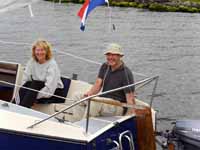
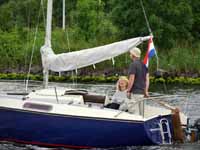
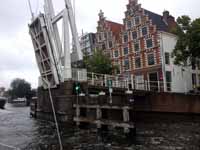
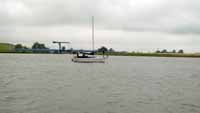
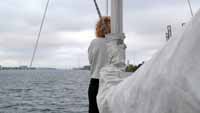
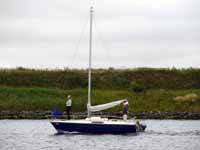
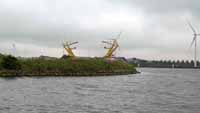
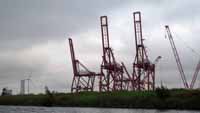
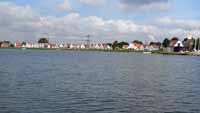
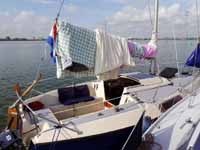
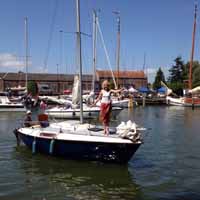
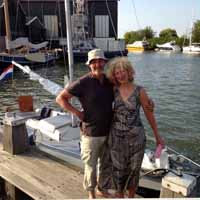
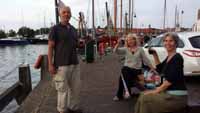
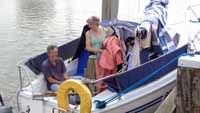
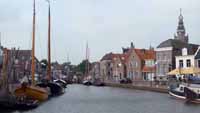
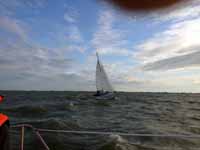
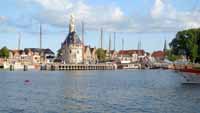
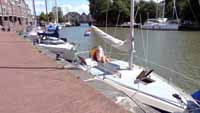
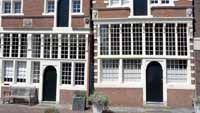
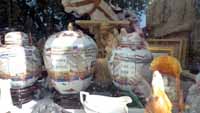
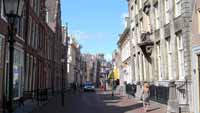
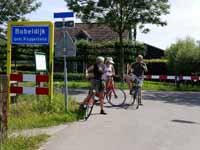
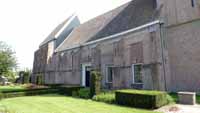
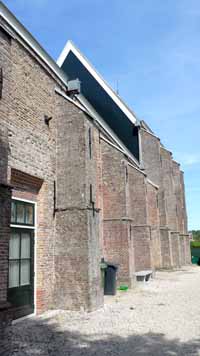
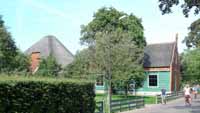
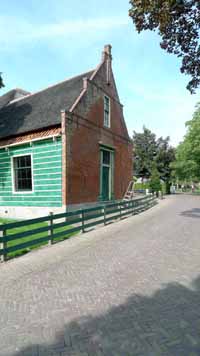
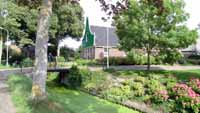
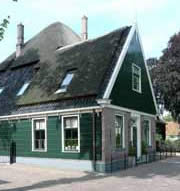
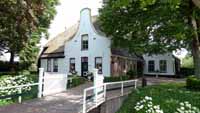
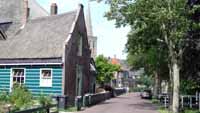
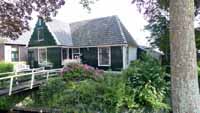
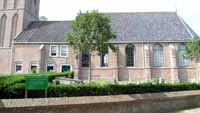
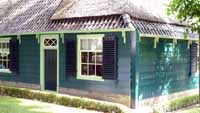
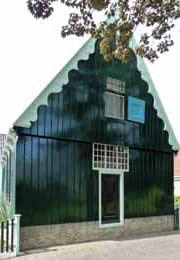
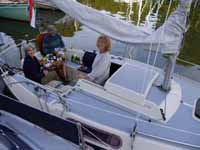
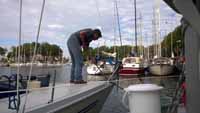
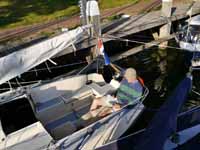
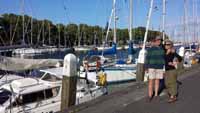
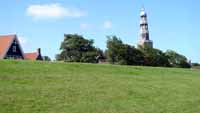
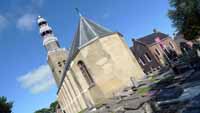
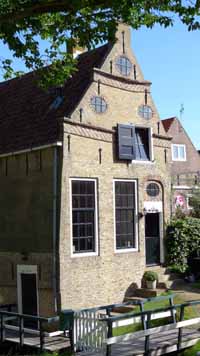
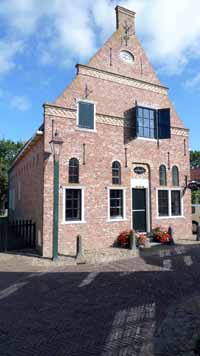
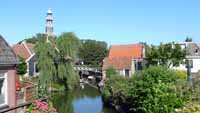
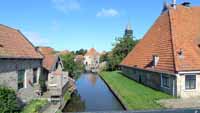
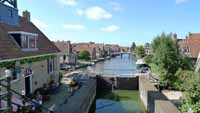
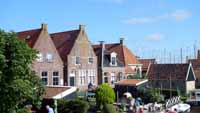
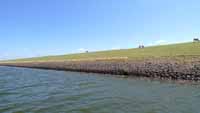
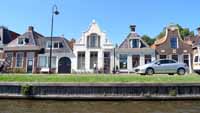
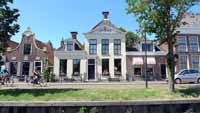
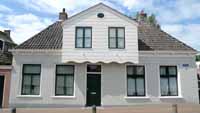
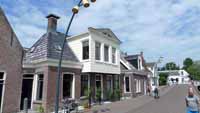
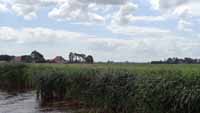
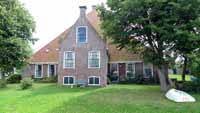
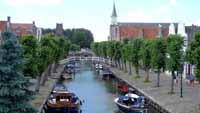
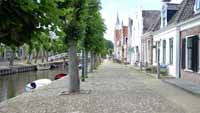
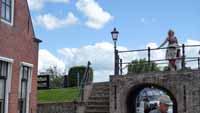
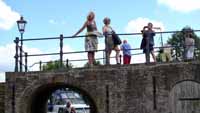
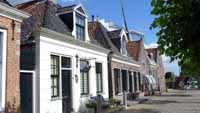
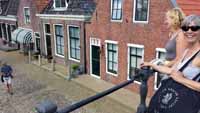
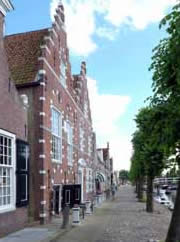
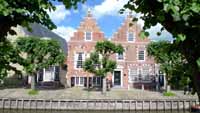
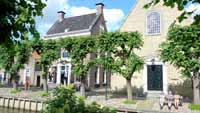
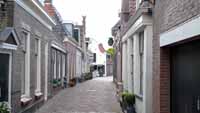
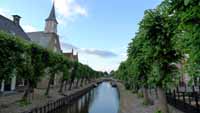
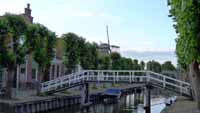
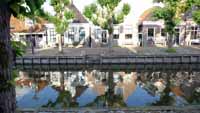
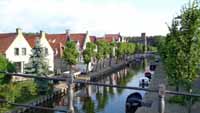
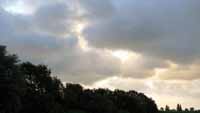
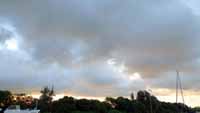
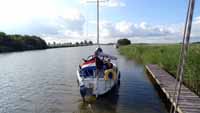
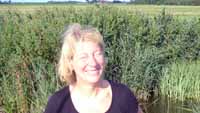
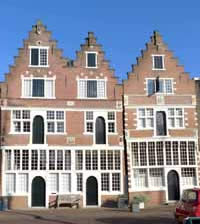
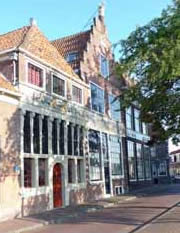
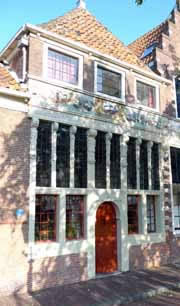
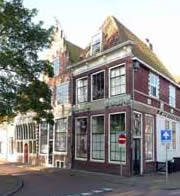
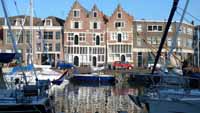
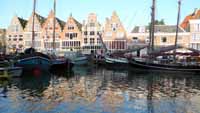
Our boat squeezed in
between others
